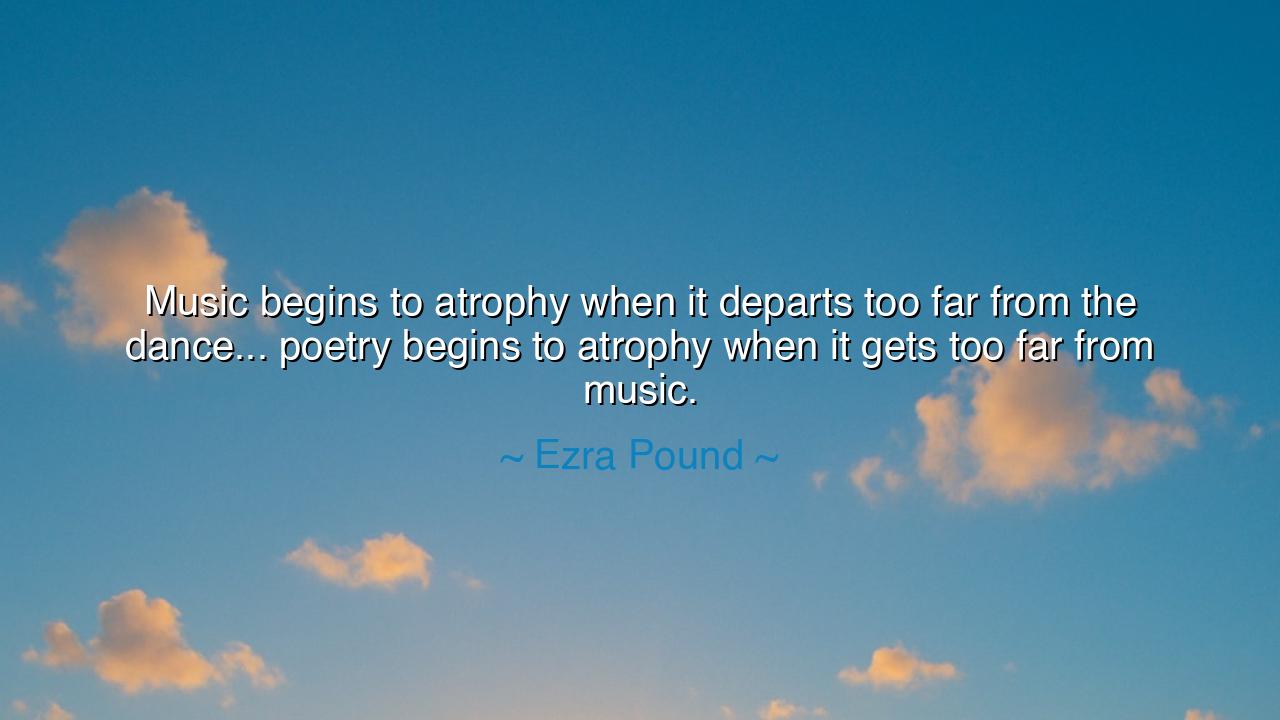
Music begins to atrophy when it departs too far from the
Music begins to atrophy when it departs too far from the dance... poetry begins to atrophy when it gets too far from music.






When Ezra Pound declared, “Music begins to atrophy when it departs too far from the dance… poetry begins to atrophy when it gets too far from music,” he was not simply speaking as a critic of art, but as a prophet of origins. His words remind us that all forms of artistic expression are born from primal roots: dance, music, and poetry were once one, a single river flowing through the body, the voice, and the soul. To sever them too far from one another is to drain them of their vitality. Like a branch cut from its tree, they wither, losing the pulse of life that first made them powerful.
The ancients knew this union deeply. In the earliest tribes, before there were written words or orchestras, there was the dance around the fire, the beating of the drum, the chant rising with the rhythm of footsteps. There was no separation of music from dance, nor poetry from song—they were the same act, an embodied expression of life itself. Pound warns us that when music forgets its origin in the body’s movement, it becomes cold and mechanical. And when poetry forgets its origin in rhythm and sound, it becomes sterile, words without breath.
History gives us striking examples of this truth. In the Baroque and Classical eras, music was still tied closely to the dance—minuets, gavottes, waltzes, all carrying the pulse of movement. But in later centuries, as certain composers sought only abstraction and intellectual puzzles, some works grew detached from the primal rhythm, admired by scholars but leaving ordinary souls unmoved. Likewise, poetry in its highest ages—from Homer’s epics to Shakespeare’s plays—was inseparable from music and performance. But when poetry became overly abstract, written for the eye alone, it risked losing the ear, and with it, the power to move the heart.
Pound’s warning, then, is not against innovation but against forgetfulness. He reminds us that art must stay rooted in the body, in sound, in rhythm. Music without dance loses the warmth of the human heartbeat. Poetry without music loses its song and becomes lifeless ink. This is not to say that music must always be danced to, nor that poetry must always be sung, but that both must remain connected to their origin in rhythm—the pulse of life itself.
Consider the endurance of folk traditions across the world. From the flamenco of Spain to the griot songs of Africa, from Irish reels to Native American chants, the greatest vitality in art comes when music, dance, and poetry are woven together. These traditions live not because they are complex or refined, but because they remain true to the unity of movement, rhythm, and story. They awaken something ancient in us, something that Pound feared might be lost in the refinements of modern culture.
The lesson for us is clear: do not let art drift too far from its roots. If you are a musician, remember the body—remember rhythm, remember the pulse that moves people to rise from their seats. If you are a poet, do not forget the music of your words, the cadence that makes them sing even when read aloud in silence. If you are a dancer, remember that your movements are part of a greater song. To keep these bonds alive is to ensure that art does not merely exist, but lives.
Practically, this means embracing rhythm and sound in all our creations. Read your words aloud; if they do not move the ear, they may not move the soul. Listen to your music—does it stir the body, even subtly, to motion? Watch your dance—does it honor the music it springs from? In cultivating this harmony, we restore the life-force that Pound believed was in danger of atrophy.
Thus, Ezra Pound’s words are not a critique alone, but a call: keep the dance in the music, keep the music in the poetry. Let art remain whole, as it was at the beginning, born of the same fire. For when the arts remember their kinship, they carry not only beauty, but power—the power to awaken body, heart, and soul as one. And in that unity lies the immortality of human expression.






AAdministratorAdministrator
Welcome, honored guests. Please leave a comment, we will respond soon